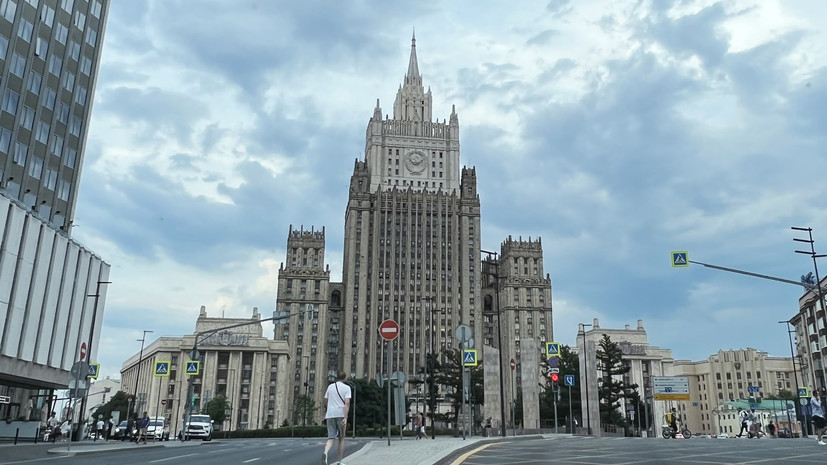The official representative of the Russian Foreign Ministry, Maria Zakharova, called the decision of the Latvian Ministry of Foreign Affairs to include the “defeat” of Russia in her list of priorities “inhuman stupidity”.
“This is a question, in my opinion, of some kind of painful stupidity, inability to calculate - what are there two moves forward - inability to calculate the situation in which they are,” Zakharova said on Radio Sputnik.
Earlier it became known that "the defeat of Russia in the conflict in Ukraine" was included in the list of foreign policy goals of Latvia.
This was stated in a report sent to the country's government by Foreign Minister Edgar Rinkevich.
According to Zakharova, the inability to calculate the situation is also characteristic of other representatives of the Baltic states.
In this regard, the diplomat mentioned the recent statement by Estonian Prime Minister Kai Kallas.
The head of the Estonian government spoke about Ukrainian refugees, noting that Estonia does not want to see another community that does not know the language of this country.
As the representative of the Russian Foreign Ministry believes, Estonia has previously sought to comply with democratic principles, among which the diplomat mentioned the attitude towards refugees and migrants, as well as guarantees of human rights and guarantees of the rights of minorities to use the language.
Now, Zakharova continued, Estonia is openly saying "that they don't need another group of people ... who don't speak their language."
The representative of the Ministry of Foreign Affairs stressed that the calls for the defeat of Russia by the Baltic states, which are heard against the backdrop of statements about the "uselessness" of refugees, indicate a lack of logic.
Also on russian.rt.com, the Latvian Foreign Ministry called the "defeat of Russia" one of the priorities of its foreign policy
“There must be some kind of primary logic, at least childish, at least naive, but it must be.
What they're saying?
They don’t even understand themselves… This is a story about inhuman stupidity and the inability to add up not just one plus one, but one plus zero,” the diplomat said.
Amendments to the law "On repatriation"
Earlier it became known about the intentions of the leadership of Latvia to develop amendments to the law "On repatriation", the purpose of which was to create conditions for people with Latvian roots to move to Latvia.
As stated in the message of the Ministry of Internal Affairs of Latvia, the department was instructed to develop appropriate adjustments to the legislation against the backdrop of the current situation.
According to the Ministry of Internal Affairs, in the past, repatriation flows were more evenly distributed between the directions of the countries of the East and West, however, the share of Russian citizens among recipients of the status of a repatriate over the past 12 years has averaged 62%.
In particular, the agency provides information according to which in 2022 the share of Russian citizens in the total number of assigned statuses of a repatriate or family member reached 81% of the total.
At the same time, the Ministry of Internal Affairs of Latvia recalled that earlier, against the background of the events in Ukraine, various mechanisms were introduced in the country that temporarily prevent the entry of Russian citizens into Latvia.
According to the agency, in 2022, 430 applications were received from Russian citizens, while the status of a repatriate or a family member of a repatriate was assigned to 220 Russian citizens.
According to the forthcoming amendments to the law, repatriates and their family members will be able to obtain a temporary residence permit for five years and then a permanent residence permit if they have lived in Latvia for five years and know the Latvian language at least at the A2 level.
Latvian Foreign Minister Edgars Rinkevics subsequently connected the growing interest of Russian citizens in the repatriation procedure with the partial mobilization that was in place in Russia last autumn.
According to Rinkevich, unwillingness to participate in mobilization in the absence of an anti-war position is not sufficient grounds for requesting a visa, temporary residence permit or repatriate status.
Anti-Russian course set by the West
Dmitry Belik, a member of the State Duma Committee on International Affairs, commented on the anti-Russian statements of the Latvian Foreign Ministry.
In a conversation with RT, the deputy noted that Latvia, which is unable to pursue an adequate foreign policy, has made hatred of Russia its priority.
“The more absurd and louder the statements of its politicians sound, the more powerful pawns they feel on a geopolitical scale,” the parliamentarian believes.
At the same time, Belik expressed confidence that Latvia does not act independently in this matter, but follows “the anti-Russian course set by the United States and its allies” in the hope of encouragement from the West.
The interlocutor of RT noted that Latvia should focus on solving its internal problems and stabilizing its "tipped" economy.
“And not to dream of “defeating” the country with which it is “fighting” with the demolition of monuments and stupid resolutions,” the deputy concluded.

